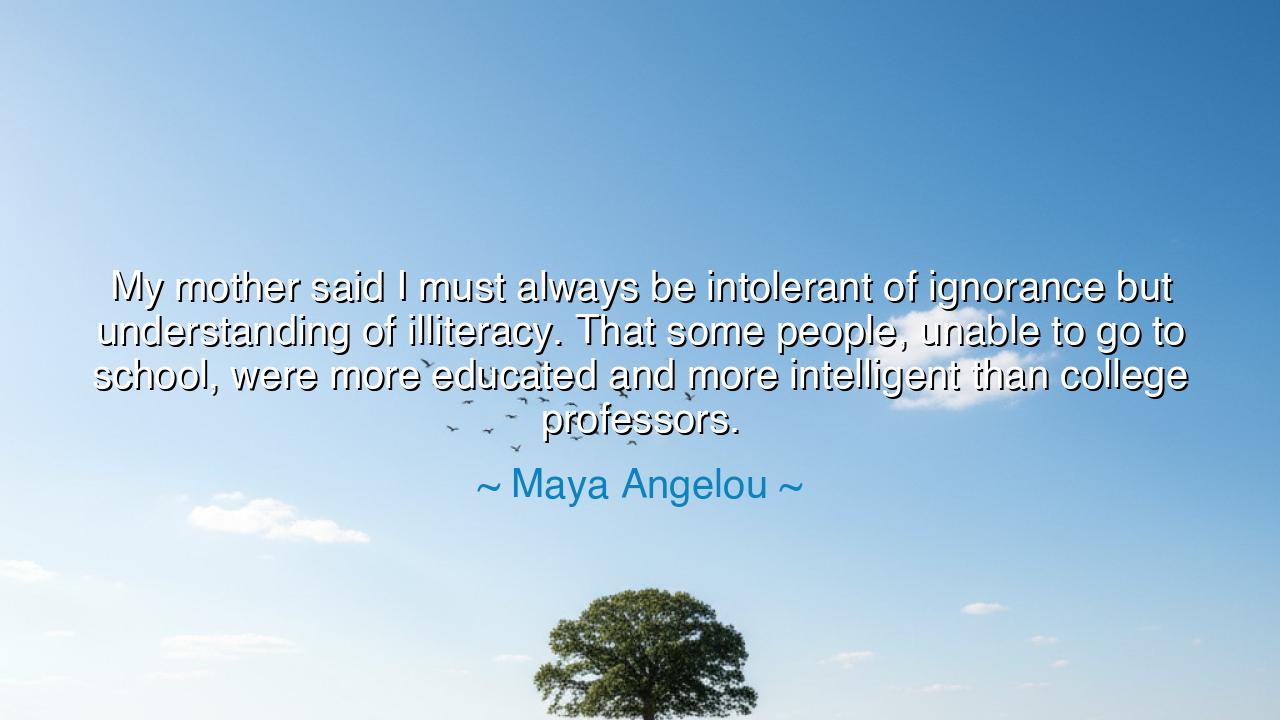
My mother said I must always be intolerant of ignorance but
My mother said I must always be intolerant of ignorance but understanding of illiteracy. That some people, unable to go to school, were more educated and more intelligent than college professors.






There are truths passed down from parent to child that carry the weight of generations, and among them is the profound wisdom of Maya Angelou, who once said: “My mother said I must always be intolerant of ignorance but understanding of illiteracy. That some people, unable to go to school, were more educated and more intelligent than college professors.” In these words lies a delicate but powerful distinction—between ignorance and illiteracy, between the absence of schooling and the absence of understanding. Angelou reminds us that education is not measured by diplomas, nor intelligence by formal instruction. True wisdom springs from the mind and heart alike, not from the walls of academia.
To understand this fully, one must first comprehend the difference Maya Angelou’s mother taught her. Ignorance is the refusal to learn, the stubbornness that closes itself to knowledge, truth, or empathy. It is a state of the soul, not the absence of opportunity. Illiteracy, by contrast, is the lack of formal schooling, the deprivation of structured education. Yet a man or woman deprived of letters may possess a mind sharper than the scholar, a heart wiser than the philosopher. Maya Angelou, through her life and writings, witnessed countless examples of profound intelligence in those whom society deemed uneducated, reminding us that knowledge is more than what is read—it is what is understood, felt, and applied.
The origin of this insight lies both in Angelou’s upbringing and in her broader vision of humanity. Born in the segregated South, she was raised in a world where opportunities were scarce, especially for African Americans and women. Her mother’s counsel was a beacon in that landscape, guiding her to recognize that intelligence cannot be measured by degrees alone. It is in observation, in listening, in resilience, in empathy, and in the capacity to act wisely in life’s complexities. Angelou internalized this lesson, and it became the cornerstone of her moral philosophy: to judge ideas, not circumstances; to honor wisdom, not credentials.
History bears testimony to the truth of this distinction. Consider Abraham Lincoln, who received little formal schooling yet rose to become one of the greatest statesmen in history. He was largely self-taught, reading by the light of the fireplace, and yet his understanding of law, morality, and human nature surpassed many formally educated men of his time. He illustrates Angelou’s teaching: that true education is the cultivation of the mind, the sharpening of judgment, and the nurturing of conscience, rather than mere familiarity with books. Lincoln’s wisdom was born of curiosity, reflection, and experience—gifts that no institution alone could provide.
Even in the realms of philosophy and literature, this principle holds. Socrates, unlettered by formal standards, challenged the most learned Athenians. His questions exposed ignorance in the proudest scholars and demonstrated that intellect is measured by the capacity for reasoning and humility, not by certificates or formal training. Angelou’s mother, like Socrates, recognized that true intelligence is often hidden in unlikely forms, nurtured by life itself rather than the rigid curriculum of schools.
The wisdom of this quote also carries a moral instruction: be intolerant of ignorance but compassionate toward illiteracy. Do not despise those who refuse to learn, for they endanger themselves and society; yet do not scorn those who simply lack formal education, for they may hold truths that the learned have missed. The world is full of self-taught minds whose experiences, reflections, and intuition illuminate what books alone cannot teach. Respect, listen, and learn from all, for wisdom often wears humble garb.
The lesson for all generations is timeless: measure people not by their diplomas but by their depth of understanding, not by the titles they hold but by the insight they offer. Seek knowledge tirelessly, but honor wisdom wherever it appears—even in those without formal schooling. Observe, reflect, and act with discernment, recognizing that life itself is the ultimate teacher. For those who listen and learn, the absence of formal letters is no obstacle to true education.
And so, let Maya Angelou’s words echo through time: “Some people, unable to go to school, were more educated and more intelligent than college professors.” Let this truth guide our hearts, temper our judgments, and inspire humility. Value not the certificate alone, but the mind that questions, the heart that empathizes, and the soul that acts wisely. In honoring the educated spirit in every form, we embrace the full richness of human intelligence and the timeless power of true learning.






AAdministratorAdministrator
Welcome, honored guests. Please leave a comment, we will respond soon